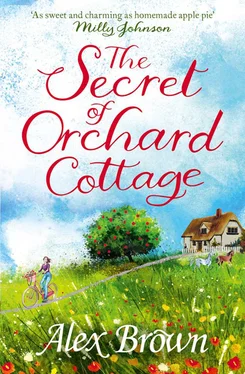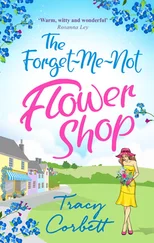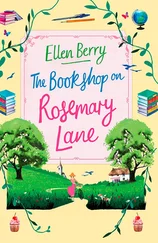
Harper
An imprint of HarperCollins Publishers Ltd
The News Building
1 London Bridge Street
London SE1 9GF
www.harpercollins.co.uk
First published in Great Britain by Harper 2016
Copyright © Alexandra Brown 2016
Cover design by Alexandra Allden © HarperCollins Publishers Ltd 2016
Cover images © Ivary / Getty Images (orchard scene); Shutterstock.com(all other images).
Alexandra Brown asserts the moral right to be identified as the author of this work.
A catalogue copy of this book is available from the British Library.
This novel is entirely a work of fiction. The names, characters and incidents portrayed in it are the work of the author’s imagination. Any resemblance to actual persons, living or dead, events or localities is entirely coincidental.
All rights reserved under International and Pan-American Copyright Conventions. By payment of the required fees, you have been granted the non-exclusive, non-transferable right to access and read the text of this e-book on screen. No part of this text may be reproduced, transmitted, down-loaded, decompiled, reverse engineered, or stored in or introduced into any information storage and retrieval system, in any form or by any means, whether electronic or mechanical, now known or hereinafter invented, without the express written permission of HarperCollins.
Source ISBN: 9780007597420
Ebook Edition © June 2016 ISBN: 9780007597444
Version 2017-10-20
For all the ordinary women everywhere,
doing extraordinary things
‘Treasure this book always, for it will stand the test of time’
– Winnie Lovell, 1941
Table of Contents
Cover
Title Page
Copyright
Dedication
Epigraph
Prologue
Chapter 1
Chapter 2
Chapter 3
Chapter 4
Chapter 5
Chapter 6
Chapter 7
Chapter 8
Chapter 9
Chapter 10
Chapter 11
Chapter 12
Chapter 13
Chapter 14
Chapter 15
Chapter 16
Chapter 17
Chapter 18
Chapter 19
Chapter 20
Chapter 21
Chapter 22
Chapter 23
Chapter 24
Chapter 25
Chapter 26
Chapter 27
Chapter 28
Chapter 29
Chapter 30
Chapter 31
Chapter 32
Epilogue
Author’s Note
Acknowledgements
About the Author
Keep Reading …
Also by Alex Brown
About the Publisher
PROLOGUE
Tindledale, June 1941 …
As the early morning sun sauntered over the apple trees in the orchard next to the cottage, bathing her bedroom in strands of glorious spun gold, Winnie Lovell tucked the last letter into an envelope and stowed it inside her handbag along with the others for posting later. Then, after replacing the lid of her fountain pen, she crouched down and swept the rug aside to lift a wonky floorboard to the left of the wardrobe and reached in between the rafters to retrieve an old wooden apple box containing her diaries dating back to when she was a little girl. Winnie placed the pen inside the box and took out the pressed purple violet one last time and held it up to her cheek, allowing herself a brief moment of contemplation before hurriedly secreting it all away back under the floor. She stood up and straightened her stockings in silence, reminding herself that this wasn’t the time for sentiment. No, absolutely not. Her mind was made up. Resolute. And there really was no going back now.
Winnie buttoned up her new khaki uniform jacket and straightened the collar, proud to be a part of the First Aid Nursing Yeomanry, or FANY as everyone said, and cast one last glance around the rose-print-papered bedroom in the eaves of the honey-stoned cottage that had been her home for all of her twenty years. She really would miss this old place, Orchard Cottage, a special place on the outskirts of Tindledale, the village where she had grown up. With its tiny school with the clock tower on the roof and the cobbled High Street, flanked either side with black timber-framed, white wattle-walled shops with mullioned windows, surrounded by lush, undulating fields full of hops, hay, lambs, cows, strawberries, buttercups and delicate pink cherry blossom in springtime that swirled all around like confetti in a breeze. All the familiarity, and there was a certain beauty, comfort even in the predictable, seasonal routine of a life lived in a rural village. But constraint too, and as much as she loved Tindledale, Winnie knew there was a whole new world waiting for her beyond the bus stop in the village square. Adventure. That’s what this was. She had waited her whole life, or so it seemed, for this very moment. She had already fulfilled her duties in the Women’s Land Army, teaching the city girls how to work the land. Luckily the base hadn’t been that far away so she had been able to hop on the bus home when she had leave, but this time it was different. As soon as the next part of her training was completed, she would go into the field and then who knew when she might next come home? But Winnie was determined to give it her all. Do her bit for the war effort. Her patriotic duty. And her parents had been so proud when Bill the postman had cycled up to the apple barn door to deliver the letter requesting her to report to the special FANY training centre located over two hundred miles away. Before war had been declared, the furthest Winnie had been was to Market Briar, the market town on the other side of the valley, and she had certainly never travelled on a train, which reminded her – she looked at the alarm clock on the cabinet beside the bed – it really wouldn’t do to be late! The next bus, on the hour every hour , left the village square at ten sharpish, and it was already nearly nine o’clock.
Winnie folded her new hand-knitted cardy into her suitcase – made especially for today with some wool unravelled from an old blanket. Make do and mend! That’s what all the women in the village were chatting about, along with ‘beauty is your duty’. So she checked her hair and make-up then applied a little more lipstick in Scarlet Pimpernel – having swapped a stick of liquorice and a book for a selection of tester sticks and a block of mascara with a couple of younger girls in the village. (Hettie and Marigold; one had an aunt who worked on the Yardley make-up counter in a department store.) She then gathered up her hat, gloves, handbag, suitcase and, lastly, the ugly gas mask in its square cardboard box with a length of string for a handle, and closed the bedroom door behind her. Winnie made her way down the rickety old staircase and into the kitchen where the homely aroma of a traditional fry-up greeted her.
‘Eggs and bacon for you, Winifred?’ her mother Delphine asked, with the hint of a French accent, lifting the edge of her apron to wipe her hands as Winnie slipped into the chair next to Edith, whose cheeks were flushed red like a pair of plum tomatoes from having been outside in the fields since the crack of dawn. As little sisters went, Edith – or Edie, as she liked to be called – wasn’t too bad. And Edie loved working in the orchards, crating up the apples and pears and tending to the horses, which was just as well now that it all came down to their father, George, and their neighbour, seventy-year-old Albert from three fields over, to keep things going, since both of their brothers had left the farm at the start of the war, having enlisted right away. Which was even more reason why Winnie was determined to do her bit. Yes, the Land Army had been fun, hard work too, but she was quite used to that, having grown up helping her father in the orchards. But now she wanted to do more; properly support the war effort like her brothers and saw no reason not to just because she was a woman. So after using every shilling she had, and with some help from her parents, she had managed to buy her uniform and was now ready to show what she could really do to help stop the Nazis in their tracks.
Читать дальше













